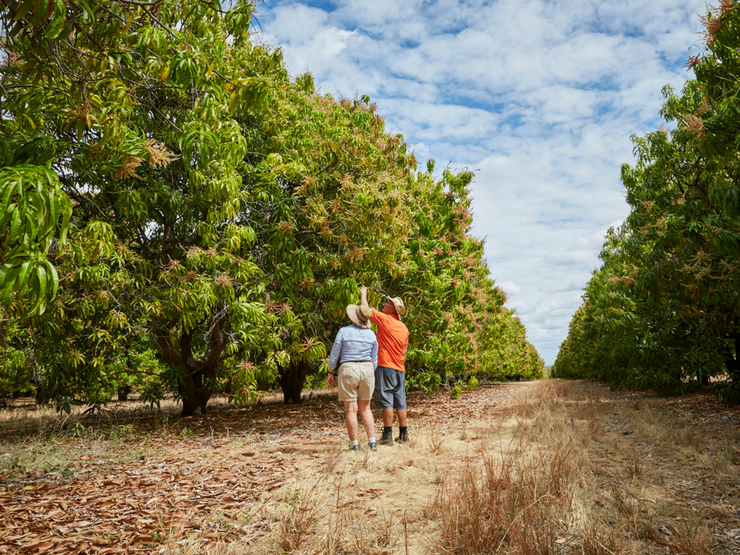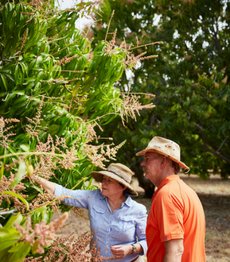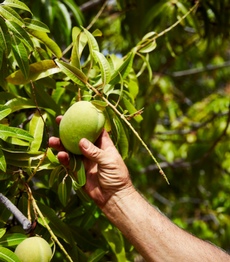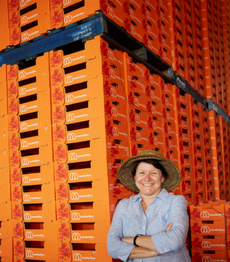Change is a constant in our global environment, but that's all the more reason to keep moving forward on your terms.


Article
In just a few years, Marie Piccone has revived the fortunes of three mango plantations and the once-renowned Manbulloo brand. A careful strategy built on meeting customers’ demands is what got her there.

Buying mango farms everyone else considers lemons takes courage, belief in your own abilities and a laser-sharp strategy to succeed. Luckily, the current managing director of Manbulloo has all that in spades.

When Marie Piccone and her partners took over three mango farms in 2005, she says they were faced with an enormous branding decision: should they keep the once-great but now poorly perceived Manbulloo brand of the Northern Territory farm or start from scratch with a new identity?
“We decided to keep the name,” explains Piccone. “What’s more, we decided to brand all three farms as Manbulloo. I knew that 10 years down the track, the backstory wouldn’t matter.” It was the right decision; by 2007, Manbulloo mangos were back in demand.
Established in the 1980s, Manbulloo was the first large commercial mango plantation in the Northern Territory, while the two current Queensland Manbulloo farms were the biggest in their state. All were dominant players in both quality and volume. However, by the early 1990s, the farms had been sold and the brands, products and service quality fell away. “In 2005, we purchased three very dilapidated mango plantations with pretty poor quality fruit and a brand that was no longer shining,” admits Piccone.
For the first five years, Piccone’s strategy was to re-establish quality and yield for the domestic market. “It’s a shorter and easier supply chain to perfect,” she says. But after their second season, Piccone started getting phone calls from international buyers saying they wanted Manbulloo mangoes again next year. “I said, ‘But we didn’t send you any!’ And they replied, ‘Oh, but we got them.’”
It turned out that her Australian wholesalers had been busy re-consigning Manbulloo around the world without Piccone’s knowledge. “Our strategy was to move into overseas markets in a very slow and controlled way,” she says. “But the market had different ideas.”
 Diving in feet first
Diving in feet firstPiccone had to grab the opportunity presented, not least to protect the brand’s rising reputation for quality. “If we didn’t send direct, then the buyers were getting our product a week older. There was a lot at stake in terms of maintaining our reputation for quality, a good supply chain and customer-focused relationships.”
She explains that they were still determined to nurture the brand very carefully. Manbulloo took a year to evaluate existing Australian exporters and determined that there was very little value in using them. “They were just selling opportunistically. There was no programming of product, no care in the supply chain, no temperature management,” states Piccone. “So we decided to establish our own export arm, Mango Road.”
Piccone is adamant that getting vertical integration right is an important part of wholesale brand building. A vertical supply chain provides the ease and trust needed for solid client relationships as well as quality control. “We are not opportunistic sellers. We set a program for every client before the season, and then we deliver it. It doesn’t matter if it’s Coles in Australia or a Japanese buyer.”
To help achieve that, one of Manbulloo’s mission statements is to be a significant part of the best mango retail chain in every market they enter. “The key is to provide competitive advantage for them as well as us. Manbulloo is known as a brand that understands what buyers need to meet local consumer demands.”
Piccone describes meeting a customer in China recently. “They buy a lot of our product from one of our Chinese ripeners, not directly from Manbulloo. But he was well aware of our brand and reputation. That shows the importance of maintaining brand throughout the supply chain.”

The United States is the only market where Manbulloo does not export under its own brand. “We use Melissa, our US partner’s well-known retail brand. It’s a better proposition,” Piccone adds pragmatically. She points out that if a buyer wants to use a brand that’s already got traction, “we’re happy to brand our product accordingly.”
Manbulloo grows two varieties of mango, Kensington Pride and R2E2. There is strong global and domestic demand for both. The 15 to 25 per cent of fruit that doesn’t make the Manbulloo premium grade is sold under the mangoes from the farm brand. “It’s a more organic, homey brand. These mangoes aren’t perfect on the outside but still taste wonderful. They go to the wholesalers and end up in fruit barns. It’s a different proposition and the brand is well known.”
The common thread throughout all Manbulloo brands is the understanding that buyers rely on Manbulloo’s performance for their own. Piccone winning the Telstra Business Woman of the Year Award in 2015, as well as Manbulloo winning Coles Supplier of the Year in the same year, were endorsements of that mindset’s success.
“We called 2015 ‘The Year of the Winning’,” quips Piccone. It seems everyone is delighted that Manbulloo is once again bearing fruit.
© National Australia Bank Limited. ABN 12 004 044 937 AFSL and Australian Credit Licence 230686.